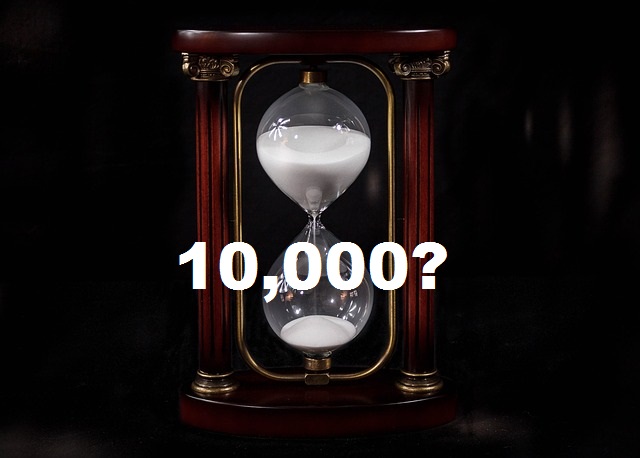
 “You can master a skill after 10,000 hours.” “Practice makes perfect.” “I’ve got 30 years of experience!” We’ve all heard these – perhaps even repeated them – and they’re all wrong.
“You can master a skill after 10,000 hours.” “Practice makes perfect.” “I’ve got 30 years of experience!” We’ve all heard these – perhaps even repeated them – and they’re all wrong.
That whole 10,000-hour thing? Not to depress those of you who are at the 9,000+ mark, but yeah, it doesn’t work that way.
Practice doesn’t make perfect either, as anyone who’s tried to fix their golf swing can attest (at least according to my mother, the avid golfer). Practice simply reinforces what you’re doing. This means if you’re doing it wrong, you’re just going to do it wrong better and faster with practice.
And does Mr. “30 years of experience” really have 30 years of experience or 1 year, experienced 30 times?
What do these all of these canards have in common? Simple. They all assume that it’s merely a matter of spending enough time at your chosen task and you’ll become an expert. If that were the case, we’d have an awful lot more amazing sports stars, politicians and yes, of course, successful traders.
Why ISN’T it simply a matter of putting in long hours to get good at something? Because it’s not the QUANTITY of time you practice, it’s the QUALITY that distinguishes between whether you’re really improving or just treading water. Practice doesn’t make perfect… PERFECT practice makes perfect.
This isn’t to say that you can become an expert without putting in your time but how do you know if you’re putting in the quality time that gets you closer to becoming an expert?
Right about now, you may be thinking, “What, exactly, defines ‘quality time’ and how do I get some?”
It’s spending time on something designed specifically to improve your performance. It’s making the practice challenging, not easy. It’s pushing yourself every time you engage in your chosen activity, trying to make it better each and every time. It feels difficult and demanding. It’s probably not super-fun.
It’s making sure your effort is not simply repetitive. If all you’re doing is the same thing, over and over, each and every trade, you may be making the same mistakes and creating really bad habits.
Quality time is active thinking time. Pay attention to what you’re doing and why. Are you following your plan? Are you getting good execution? Do you really understand what you’re doing or are you just trying to mimic something you’ve seen? If you’re trading the M3, ROCK or Bearish Butterfly, are your returns roughly in line with those of the website trade? If not, do you know why?
It’s not always easy to judge if you’re doing well because you know what you’re doing, or if you’re just getting lucky.
Hey! That’s another adage we can throw away – “It’s better to be lucky than good.” In the long run, the market will completely demolish the merely lucky.
Even when you (objectively) KNOW you’re focusing on the right things, how do you know if you’re improving? How do you know if your trading time was quality time or simply time?
Because of the next critical part – what happens AFTER the trade. Don’t just close the trade and move on. This is your chance to review, perhaps alone, preferably with a mentor or senior trader, exactly what you did. You’ll be able to look at it without the time pressure of the market, without any distractions, emotions or opinions, and figure out how to improve. Of course, this is ONLY possible if you’ve been journaling along the way, but of course you have been!
In reviewing your journal, one of the most important things to note is WHY you did something. This is where you start to recognize if you’re spending that quality time that will help you become an expert. If you made an adjustment because you had an opinion that the market was going to do such-and-so and it didn’t, then it’s not a surprise that the adjustment didn’t help your trade the way you expected. On the other hand, if the market DID do as you expected but you didn’t get your expected results, it’s important to dig into why it didn’t work.
Without documenting and reviewing your expectations and results, there’s no way to understand whether you were good or lucky.
If you’re already trading well, your quality time is spent trying to be more consistent, to deepen your understanding, to improve your planning. If you are just putting in your time, not really thinking about or understanding your trade, not being observant and generally just goofing around, you’ll never get better, no matter HOW many hours you put in. It’s isn’t just practice, it isn’t just hours, it’s trying to be perfect each and every time.
Don’t worry about time limits. Yes, you’re probably still going to have to put in those 10,000 hours but it’s how you spend those hours that matters. Perfect practice, repeatedly, is how to eventually master a skill.
Written and contributed by Cynthia Sarver, Successful Options Trader of the Month – February 2016

Great reminders Cynthia. And yes i agree! As i was reading this i was reminding myself that losses are part of life. Trying to over optimize the trade to avoid your last loss may not be a good idea and could leave you exposed somewhere else. Thanks for stimulating good thinking.